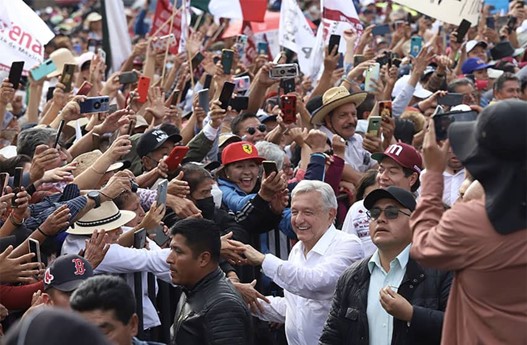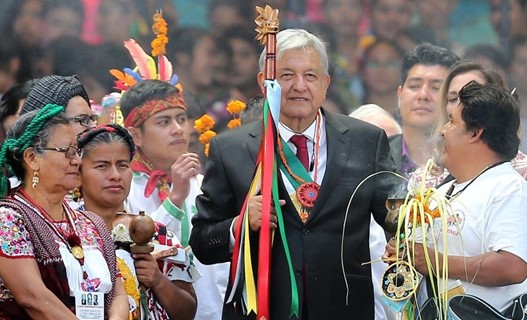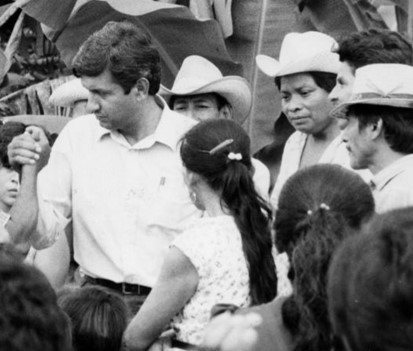|
|
|
|
The weekly newsletter of the México Solidarity Project |
|
|
|
Online at mexicosolidarityproject.org |
|
July 5, 2023/ This week's issue/ Meizhu Lui, for the editorial team |
|
|
Image: Dennis Magilov |
|
México’s President: What the Heck?! |
|
If you follow the New York Times, the Washington Post, or any other major US mainstream media outlet, you “know” by now that México’s president, Andrés Manuel Lopez Obrador, has become just another autocrat in Latin America’s “strong man” tradition. You also “know” he’s manufactured massive demonstrations to advance “anti-democratic” policies like reforming México’s federal electoral commission and that his economic policies — like nationalizing the energy sector — will cause sheer disaster for the Mexican economy. On top of all that, our U.S. media solemnly swear, AMLO is persecuting indigenous people and ignoring his nation’s collusion between politicians and cartels.
Where do all these incredibly distorted takes on reality in México today come from? Our mainstream US media see the world through a corporate, nationalist lens. They get their “inside” scoop from their neoliberal counterparts in México. They simply cannot see reality through the lens of Mexican history and culture or from a working class point of view, and that failure leaves our mainstream pundits scratching their heads when they find — to their shock — that ordinary Mexicans don’t just support AMLO, they love him.
How can this blustering buffoon, these pundits must be wondering, still have a favorable rating near 70 percent after five years in office? How can México’s economy, for that matter, be getting stronger, as evidenced by the peso’s rising value against the dollar? Why aren’t most indigenous tribes opposing the Tren Maya? How can AMLO be funding social programs by curbing government expenses, arresting corrupt former government officials, and recouping the money they’ve stolen? Impossible! All downright unAmerican!
The México City-based historian Andrew Paxman, in our interview this week, has some thoughts on why western media get so much about México so wrong, why our media have missed the story of how and why AMLO has become one of the most fascinating, influential, and uniquely beloved political leaders of our time.
You didn’t know that? Not your fault. That reality, to our press, just doesn’t rate as news. |
|
|
|
Don’t miss an issue! Sign up for a free México Solidarity Bulletin subscription. |
|
|
|
|
AMLO: Understanding the Man and His Mission |
|
Andrew Paxman, a professor of history at the Center for Research & Teaching in Economics in México City, is currently finishing a book about the recent history of the Mexican press and starting a biography of President López Obrador for Penguin Random House México. His previous books include El Tigre, a co-authored biography of media mogul and Televisa owner Emilio Azcárraga Milmo, and Jenkins of Mexico: How a Southern Farm Boy Became a Mexican Magnate. Paxman has also edited Los gobernadores, a look at México’s post-revolutionary and contemporary state governors. |
|
|
How have AMLO’s class background and life experiences defined his political formation?
I’ve not heard AMLO use a class label for himself. But his parents were modest, hardworking, and successful shopkeepers. His famous personal austerity probably owes much to his parents’ example.
AMLO comes from Tabasco, a hot, humid, and watery state unlike most of the rest of México and also — discounting for oil revenue — relatively poor. Imagine coastal Louisiana without New Orleans. Tabasco has an important indigenous heritage, a state-dependent economy, a highly submissive press, and a large Protestant minority. All these traits have influenced AMLO.
Tabasco also has an impressive literary tradition. The titan of that tradition, the poet and politician Carlos Pellicer, mentored AMLO in the 1970s. Pellicer used to lead tertulias, literary gatherings, at his home, discussing Tabasco’s history and culture, and that background helps explain AMLO’s hobby as an amateur historian. He’s written five books of history. In 1976 AMLO worked on Pellicer’s successful Senate campaign. Pellicer advocated for indigenous peoples’ rights, and AMLO has as well.
What influenced AMLO ideologically? His orientation seems to line up most with liberation theology’s “preferential option for the poor.”
AMLO does use religious language from time to time, quoting the Bible. He’s been seen reading the Bible on plane trips — he usually flies coach — and he named his youngest son Ernesto Jesús, as in Ernesto “Che” Guevara and Jesus Christ. During AMLO’s last campaign, Jorge Ramos of Univision asked him about his faith point blank. AMLO replied: “I’m a Christian in the broad sense of the word.”
In secular terms, AMLO takes inspiration from three former presidents. The first: Benito Juárez, the key liberal leader of the mid-19th century and an indigenous Mexican, followed by Francisco Madero, the “apostle” of the Revolution of 1910, and then Lázaro Cárdenas, who did more than anyone to bring that revolution to fruition in the 1930s. Cárdenas nationalized the oil industry and seized extensive private estates to parcel out to the poor. He sided with labor during an era of strikes and tried to stand up to business elites. |
|
AMLO sees his “Fourth Transformation” of México, or “4T,” as a sequel to these three transformative eras and one that’s necessitated by the inequalities worsened by the neoliberal era of 1982 to 2018.
AMLO has won the love of México’s common people. How? You can put money in a person’s pocket and they might appreciate it, but that doesn’t generate love.
I think AMLO’s popularity rests on three pillars. First, his back story as a fighter against entrenched elites, what he’s long called “the mafia of power.” |
|
|
Photo: AMLO speaking at a rally celebrating |
|
In México, this makes for a potent trope, and I’ve written a paper explaining its persuasiveness. Second, money in people’s pockets. The AMLO years have seen large annual increases in the minimum wage. His new national person plan both supports the elderly and enables their children to better their own lot. And, third, the intangible work AMLO has done affirming the poor, through his rhetoric and his weekend trips to every part of México.
The poor feel they have an advocate in AMLO. I think a lot of analysts miss this point because dignity cannot be quantified. So they attribute his popularity to old-school clientelism. |
|
You could summarize these three points as “populism.” But I would call AMLO a populist with an asterisk, because he rejects several major strategies from the populist playbook.
AMLO doesn’t stigmatize ethnic or religious minorities. He doesn’t engage in massive, debt-financed public spending. And his nationalist rhetoric has been softer than I expected, especially towards the US. This in turn reflects his pragmatism, another AMLO trait that’s gained little attention. |
|
|
In 2018, AMLO became the first Mexican president to participate in an indigenous cleansing ceremony and receive a staff signifying authority at his inauguration. Photo: Edgar Negrete Lira/Cuartoscuro.com |
|
AMLO inherited a nation with a long history of corrupt and undemocratic rule by the PRI and PAN parties, and political and business elites are strenuously organizing against his reforms. And he also has to deal with the colossus to the North! What’s he doing to counter these internal and external threats?
Many say AMLO has no strategy, that he improvises and tries to lead by example, but one concrete thing he’s done is to place a great deal of México’s public works and public services in the hands of the military. The reason? He deems the military as less corrupt and more obedient than the existing government bureaucracy. When you consider the embedded corruption in so many of México’s 31 states, he may well be right.
As for AMLO’s relationship with the United States, his policy toward Central American migrants — letting México act as a barrier and shelter — appears designed to appease the US. Politically, this comes at a low cost, because we see, unfortunately, little solidarity between average Mexicans and average Central Americans. AMLO has recently limited the activities of the US Drug Enforcement Administration. That plays well at home and probably doesn’t upset the Biden administration quite as much as it would have upset Trump.
Many on the western left appear confused by AMLO’s political contradictions. They can’t decide if he’s a progressive to be supported or a conservative to be opposed.
AMLO’s most cited contradiction concerns his self-projection as a leftist and his evident social conservatism. But that only rates as a contradiction if you conflate leftism with social liberalism. Foreign observers and many local Mexican commentators educated abroad often disqualify AMLO as a leftist because he’s not a social liberal. But leftism and liberalism are distinct traditions, and more so in México than in the United States. México shares the depth of this distinction with my own country, the UK.
The debate is not over whether or not AMLO ranks as a socialist — a label curiously absent from discussions about him, despite his interest in state-led development — but over whether or not he is more broadly as a leftist. To my mind, AMLO resembles what we used to call in England a “cloth-cap socialist”: a social conservative and environmental skeptic, but a believer in big government, strong unions, a generous welfare state, and solidarity with left governments abroad. |
|
This helps explain why AMLO’s best friend in Europe has been Jeremy Corbyn, the former Labour Party leader, who’s from the left wing of that party.
What lessons can we learn from AMLO’s success?
At this stage, I think our answers must be tentative. |
|
|
AMLO’s 2018 inauguration/Getty Images |
|
One lesson seems to be that most Mexicans — like Brazilians with respect to Lula — put a lot of stock in politicians who’ve been activists, especially politicians who’ve had to compete for high office several times before getting elected. In a country heavily scarred by local political dynasties and “plurinominal” lawmakers who get their seats through exchanges of favor rather than via the ballot box, this makes AMLO still more distinctive.
AMLO’s personal austerity is also an asset. So is his ability to dominate the daily news cycle through his morning press conferences, mañaneras, where his somewhat folksy, us-and-them rhetoric seems to play well with the majority of Mexicans. |
|
These traits are difficult to replicate, and none of the politicians vying to succeed AMLO have shown they have them.
So while the Morena candidate will almost certainly win in next year’s election, the next president will find it hard to match AMLO in popularity, no matter how effective a leader he or she proves to be.
In turn, this may allow AMLO an unusual level of post-presidential influence. |
|
|
AMLO in 1983, when he headed |
|
|
The Poet and Pol Who Shaped México’s President |
|
Carlos Pellicer, an early influence on AMLO in their native state of Tabasco, became a nationally known patriotic poet and political activist. The young Pellicer studied in México City with Diego Rivera and José Clemente Orozco and later founded the Grupo Solidario del Movimiento Obrero. He would go on to help open several museums, including one honoring the work of Frida Kahlo. In 1976 Pellicer began representing Tabasco in the Mexican Senate. He died, at age 80, in 1977. |
|
Diego Rivera, Portrait of Carlos Pellicer, 1942 |
|
|
Translator's note: For our English language readers, we are presenting this poem by Carlos Pellicer in its original Spanish. Translating poetry is an art best undertaken by poets profoundly familiar with cultural nuances in both languages.
|
|
La Bandera Mexicana |
|
La bandera mexicana en sus colores aloja la Patria en flor soberana. Cuando en las manos tenemos nuestra bandera, es como tener entera agua, naves, luz y remos.
Cuando alzamos sus colores, siente nuestro corazón la dicha de una canción que se derrama en flores.
Por amor a mi bandera, les digo a todos “hermano.” El que la lleve en la mano lleva la paz donde quiera.
Paz, trabajo, amor, y fe son de mi bandera el cielo. Yo quiero, por todo anhelo, digno de ella estar al pie. |
|
|
Recent news reports and commentaries, from progressive and mainstream media,
Owen Schalk, Canada Is Trying to Stop AMLO From Putting Mexico in Control of Its Own Resources, Jacobin. AMLO’s effort to increase state sovereignty in Mexico’s energy, mining, and agriculture sectors has tested his relations with the other North American powers.
Rodolfo Azomoza Pastor, A un paso de llegar. México y su realidad migratoria, des Informémonos. Las causas de la migración son complejas. En muchas de estas situaciones, ni siquiera es la persona en situación de migración la que toma la decisión: esta es determinada por las circunstancias en las que se encuentra y la realidad que la rodea.
Felipe De La Hoz and Gaby Del Valle, In wake of Trump threat, birthright citizenship at issue again. Border/Lines. Florida Governor Ron DeSantis dedicated his entire first big policy rollout to immigration restriction, including a pledge to do away with birthright citizenship.
Paul Wiseman, Mark Stevenson y Tom Krisher, El tratado comercial ayuda a trabajadores y acaba con sindicatos proempresa en México, Sin Embargo. Previo al T-MEC, los sindicatos proempresariales en México firmaban contratos a espaldas de los trabajadores. Las huelgas eran raras, los salarios se mantenían bajos y los líderes sindicales se enriquecían.
David Bacon, A Cooperative Farm’s Long Path to Liberation for Farmworkers, Civil Eats. Tierra y Libertad, the first farmworker-owned co-op in the Pacific Northwest, is growing a solidarity economy.
AMLO: autores de bombas en Guanajuato y Michoacán están identificados y son muy violentos, Indigo. El presidente advirtió que los perpetradores están fuertemente armados y actúan con un alto grado de violencia.
Charles Kennedy, México’s Nationalist Policies Squeezing Oil Trade Margins, OilPrice.com. One of the world’s largest oil traders, Trafigura, has been forced to scale back its Mexican oil trading business thanks to the country’s nationalist policies taking a toll on corporate profit margins.
Avanza caravana contra ley antinmigrante de Florida, La Jornada. El pasado lunes 26 de junio, el precandidato presidencial republicano Ron DeSantis prometió poner fin a la ciudadanía por derecho de nacimiento, terminar la construcción del muro en la frontera sur y enviar fuerzas estadounidenses a México a combatir a los cárteles de las drogas.
México's Sheinbaum advances in race for ruling party presidential ticket, polls show, Reuters. Results from a range of polls will guide the Morena presidential candidate choice. https://www.reuters.com/world/americas/mexicos-sheinbaum-leads-race-ruling-party-presidential-ticket-poll-2023-06-28/
Viri Ríos, Cómo Iztapalapa se puso guapa, Milenio. Mucho se ha escrito sobre la asombrosa transformación urbana que está sucediendo en Iztapalapa durante este sexenio. Lo que no se ha escrito es cómo se logró. |
|
|
The Mexico Solidarity Project brings together activists from various socialist and left organizations and individuals committed to worker and global justice who see the 2018 election of Andrés Manuel López Obrador as president of México as a watershed moment. AMLO and his progressive Morena party aim to end generations of corruption, impoverishment, and subservience to US interests. Our Project supports not just Morena, but all Mexicans struggling for basic rights, and opposes US efforts to undermine organizing and México’s national sovereignty.
Editorial committee: Meizhu Lui, Bruce Hobson, Bill Gallegos, Sam Pizzigati, Courtney Childs, Victoria Hamlin, Agatha Hinman, Daniel McCool, Jesús Hermosillo, Peter Shapiro. To give feedback or get involved yourself, please email us! |
|
|
|
Subscribe! Get the México Solidarity Bulletin in your email box every week. |
|
|
|
Web page and application support for the México Solidarity Project from NOVA Web Development, a democratically run, worker-owned and operated cooperative focused on developing free software tools for progressive organizations. |











